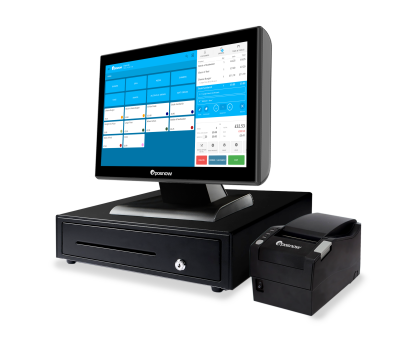What is a Point of Sale Transaction?
Electronic point of sale (POS or EPOS) systems have had an undeniable impact on the way we do business. Transactions between customers and businesses are faster, more efficient, and more secure on both ends.
Thanks to these modern marvels of POS software and hardware, customers can get what they need faster and businesses can make more profit. As consumers continue to move away from cash, POS transactions have become the backbone of successful businesses.
That being said, if you’re unfamiliar with the terminology, you may be asking yourself, “what is considered a point of sale transaction?” We’re going to answer that question and more in this helpful blog.
Point of sale transaction definition
In the most basic terms, a point of sale transaction is an exchange of goods or services for money conducted by a point of sale or cash register. While these transactions traditionally used cash payments, consumer habits have changed and many now prefer to use debit or credit cards to pay.
Payment processing
There are as many different types of POS transactions as there are ways to pay. Some POS providers may only support a few payment options. Other systems, such as the Epos Now systems, allow businesses to accept any type of payment. This, in turn, improves the customer experience as it allows them to pay the way they want.
Depending on the company, some systems will use either an external or internal payment processor. While both options have their pros and cons, generally a company with an internal payment processing system can offer greater benefits. This can be seen with Epos Now Payments which offers a single customized rate.
If you’re unfamiliar with how payment processing works, it can be broken down into three steps:
- Authorization - The customer inserts their chip card into the card machine and enters their pin. Their bank is alerted to the transaction and verifies the card as legitimate. This is done by checking the details on the card against the data the bank has.
- Authentication - Once the card details are verified, the bank then checks the transaction is authentic. The bank will then authorize the release of credit to the business's merchant account.
- Settlement - At this point, the transaction concludes, the receipt printer will print a receipt, and the money is transferred into the merchant account. Depending on the system and banks involved, this can be instantaneous or take a day or two.
Specialized systems
In addition to smoother and safer transactions, there are innumerable benefits that come with using a POS system. Epos Now produce specialized systems for the retail and hospitality industries that are designed to meet the exact needs of their diverse range of customers.
Depending on the industry and the business, point of sales systems can do a number of different things. They all share common features such as the ability to accept payments and process sales. For example, retail systems will have sophisticated inventory management tools while hospitality systems will feature front and back of house staff management integrations.
With Epos Now systems, this specialization is at the core of their hardware and software. One of their biggest selling points is their fully integrated App Store. This store offers hundreds of apps that allow entrepreneurs to customize their system to meet the exact needs of their business.
Gain all the advantages of an POS system with detailed, flexible, downloadable reports, and so much more:
- Manage and update products quickly with easy to use software
- Expand your business into multiple channels and integrate with a variety of online platforms
- Manage multiple locations and salespoints with multi-site management
- Keep queues short with streamlined, modifiable sales processes
- Choose a setup that suits you with software and hardware options

Types of transactions
As mentioned above, there are a number of different kinds of transactions. These transactions are defined by the way the customer pays for goods or services. Each and every consumer will have their own favorite way of paying and it’s important to be able to cater to their needs and wants.
What is signature point of sale transactions?
A signature point of sale transaction is a payment that requires the customer’s signature to complete. These transactions are a manual process that is usually seen in countries where chip and pin is less common. While some would argue these transactions offer better security than online transactions, the opposite is true as anyone can copy a signature.
What is a credit card point of sale transaction?
Transactions conducted with a credit card are called credit card transactions. This is when a customer opens a line of credit with a bank and uses it to buy goods or services. These transactions build the customer’s credit score and are conducted using card machines.
TIP: For more information, check out our guide on how to accept credit card payments.
What is a point of sale debit card transaction?
Unlike credit card transactions, debit card transactions do not operate using a line of credit extended by a bank. Debit card transactions take money directly from the customer’s personal bank account. Unlike credit cards, debit cards do not help build better credit scores.
What are cash point of sale transactions?
Cash transactions are the simplest transactions as they are just simple exchange. The customer offers money and the business offers the good or service. Traditionally the most popular way to pay, in recent years card transactions have been slowly usurping the role of cash in business transactions.
A POS system built for simple transactions
At Epos Now, we believe that things should be as simple as possible for both the business and the customer. Our POS systems are designed with this ethos in mind and allow us to offer safe, simple, and secure transactions.
If you’re interested in finding out more about Epos Now, get in touch with our expert team below.
Discover the essential insights on EMV technology and its impact on secure payments. Read our blog "EMV Meaning: What It Is and Why It Matters for Secure Payments" to learn how this powerful tool safeguards your transactions and enhances financial security.




